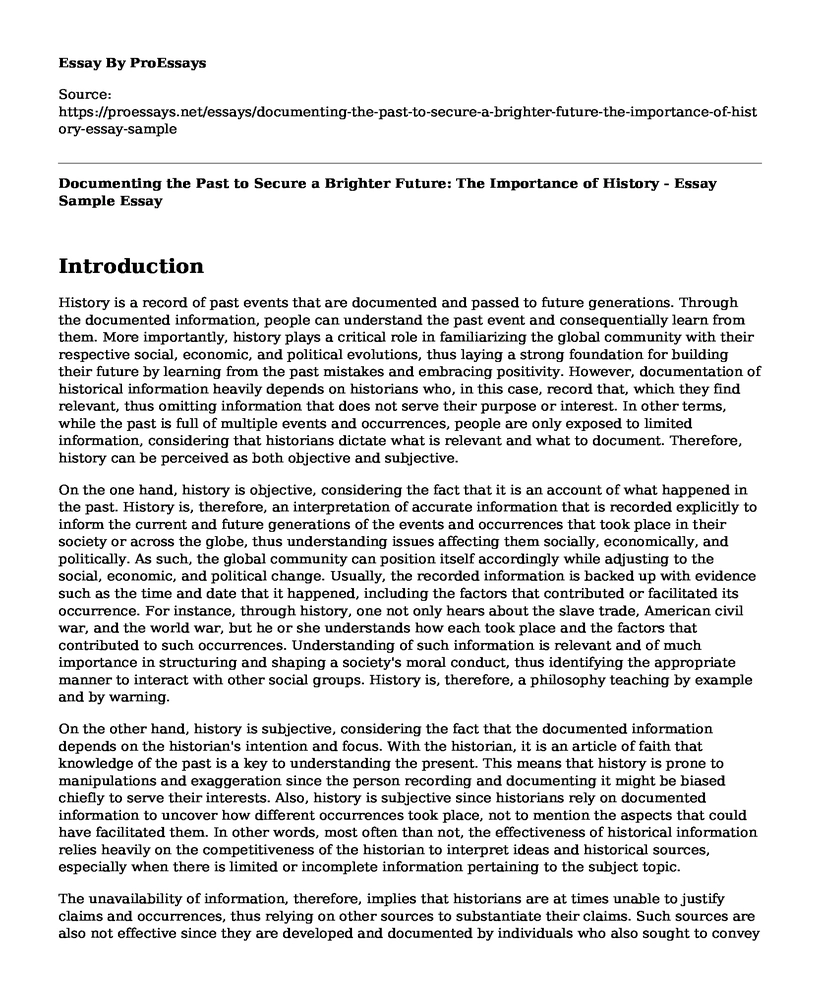Introduction
History is a record of past events that are documented and passed to future generations. Through the documented information, people can understand the past event and consequentially learn from them. More importantly, history plays a critical role in familiarizing the global community with their respective social, economic, and political evolutions, thus laying a strong foundation for building their future by learning from the past mistakes and embracing positivity. However, documentation of historical information heavily depends on historians who, in this case, record that, which they find relevant, thus omitting information that does not serve their purpose or interest. In other terms, while the past is full of multiple events and occurrences, people are only exposed to limited information, considering that historians dictate what is relevant and what to document. Therefore, history can be perceived as both objective and subjective.
On the one hand, history is objective, considering the fact that it is an account of what happened in the past. History is, therefore, an interpretation of accurate information that is recorded explicitly to inform the current and future generations of the events and occurrences that took place in their society or across the globe, thus understanding issues affecting them socially, economically, and politically. As such, the global community can position itself accordingly while adjusting to the social, economic, and political change. Usually, the recorded information is backed up with evidence such as the time and date that it happened, including the factors that contributed or facilitated its occurrence. For instance, through history, one not only hears about the slave trade, American civil war, and the world war, but he or she understands how each took place and the factors that contributed to such occurrences. Understanding of such information is relevant and of much importance in structuring and shaping a society's moral conduct, thus identifying the appropriate manner to interact with other social groups. History is, therefore, a philosophy teaching by example and by warning.
On the other hand, history is subjective, considering the fact that the documented information depends on the historian's intention and focus. With the historian, it is an article of faith that knowledge of the past is a key to understanding the present. This means that history is prone to manipulations and exaggeration since the person recording and documenting it might be biased chiefly to serve their interests. Also, history is subjective since historians rely on documented information to uncover how different occurrences took place, not to mention the aspects that could have facilitated them. In other words, most often than not, the effectiveness of historical information relies heavily on the competitiveness of the historian to interpret ideas and historical sources, especially when there is limited or incomplete information pertaining to the subject topic.
The unavailability of information, therefore, implies that historians are at times unable to justify claims and occurrences, thus relying on other sources to substantiate their claims. Such sources are also not effective since they are developed and documented by individuals who also sought to convey information that they deemed relevant, thus omitting information that failed to suit their interests. Evidently, there is no history of mankind, there is only an indefinite number of histories of all kinds of aspects of human life.
Cite this page
Documenting the Past to Secure a Brighter Future: The Importance of History - Essay Sample. (2023, Apr 06). Retrieved from https://proessays.net/essays/documenting-the-past-to-secure-a-brighter-future-the-importance-of-history-essay-sample
If you are the original author of this essay and no longer wish to have it published on the ProEssays website, please click below to request its removal:
- The Perils of Indifference Essay Example
- The Period of Islamic Spain and Renaissance Essay Example
- Essay Example on The Life of Arnold Schoenberg: An Aussie-American Composer's Rise From Humble Beginnings
- Sectionalism: The Growing Divide Between North & South US - Essay Sample
- Essay Example on Magistrate Caught in Bind: Abina's Case Poses Tough Decision
- Paper Example on Roman History: Cassius Dio's Insight on Marcus Antoninus
- Comparing Norma Jean from "Shiloh" to Winnie Mandela - Essay Sample







